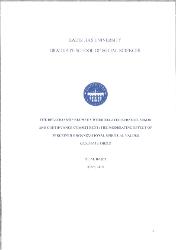| dc.contributor.advisor | Yeniaras, Volkan | en_US |
| dc.contributor.author | Başer Erdemirci, Hilal | |
| dc.date.accessioned | 2020-06-10T11:34:26Z | en_US |
| dc.date.available | 2020-06-10T11:34:26Z | en_US |
| dc.date.issued | 2016 | en_US |
| dc.identifier.uri | https://hdl.handle.net/20.500.12469/2897 | |
| dc.description.abstract | The concept of burnout in modern workplaces has been acknowledged in management literature as an important area of research, as burnout is argued to be a type of threat in today's workplace environments that employees are exposed due to the high work demands. The objective of this study is to explore the moderating effect of perceived organizational spiritual values on work related burnout and vigor and the mediating effect of vigor on work related burnout and continuance commitment in the Turkish context. The Job Demands Resources (JD-R) Model (Bakker and Demerouti 2007; Demerouti et al. 2001) was applied as the main theory while researching the related topics. This study employed a quantitative research method to collect data for the measurement of the hypotheses and their relationships. A survey was conducted in order to test the research hypotheses and the proposed conceptual model. Data for this research were collected by means of questionnaires administered to 154 service employees in Turkey, by using the random sampling method. The result of this dissertation provided that the employee's perception about their organizational spiritual values has a significantly moderating effect on the relationship between work related burnout and vigor. Furthermore, the level of perceived organizational spiritual values also influences the mediating effect of vigor on continuance commitment conditionally. | en_US |
| dc.description.abstract | Araştırmalar, çalışanların yüksek iş talepleri nedeniyle tükenmişliğe maruz kaldığını göstererek, bunun günümüz işyerini tehdit eden bir unsur olduğunu tartışmaktadır. Bu çalışmada örgütsel manevi değerlerin işe bağlı tükenmişlik ve dinçlik üzerindeki düzenleyici etkisi, dinçlik kavramınınsa işe bağlı tükenmişlik ve devamlılık bağlılığı üzerindeki aracı rolü incelenmiştir. İlgili konuyu araştırırken, İş Talep Kaynakları Modeli (Bakker ve Demerouti 2007; Demerouti vd. 2001) ana teori olarak uygulanmıştır. Bu araştırma için Türkiye'deki 154 hizmet sektörü çalışanından anket yoluyla veri toplanmıştır. Araştırmanın sonucunda çalışanların algıladığı örgütsel manevi değerlerin önemli ölçüde işe bağlı tükenmişlik ve dinçlik (işteki canlılık) arasındaki ilişkiyi etkilediği gösterilmiştir. Ayrıca, çalışan tarafından algılanan örgütsel manevi değerlerin devamlılık bağlılığı ve çalışanın dinçliği arasındaki ilişkiyi etkilediği görülmüştür. | en_US |
| dc.language.iso | eng | en_US |
| dc.publisher | Kadir Has Üniversitesi | en_US |
| dc.rights | info:eu-repo/semantics/openAccess | en_US |
| dc.subject | Burnout | en_US |
| dc.subject | Vigor | en_US |
| dc.subject | Organizational Spiritual Values | en_US |
| dc.subject | Continuance Commitment | en_US |
| dc.subject | Tükenmişlik | en_US |
| dc.subject | Dinçlik | en_US |
| dc.subject | Örgütsel Manevi Değerler | en_US |
| dc.subject | Devam Bağlılığı | en_US |
| dc.title | The relationship between work related burnout, vigor and continuance commitment: The moderating effect of organizational spiritual value | en_US |
| dc.type | masterThesis | en_US |
| dc.department | Enstitüler, Lisansüstü Eğitim Enstitüsü, İşletme Ana Bilim Dalı | en_US |
| dc.relation.publicationcategory | Tez | en_US |
| dc.identifier.yoktezid | 429281 | en_US |
















